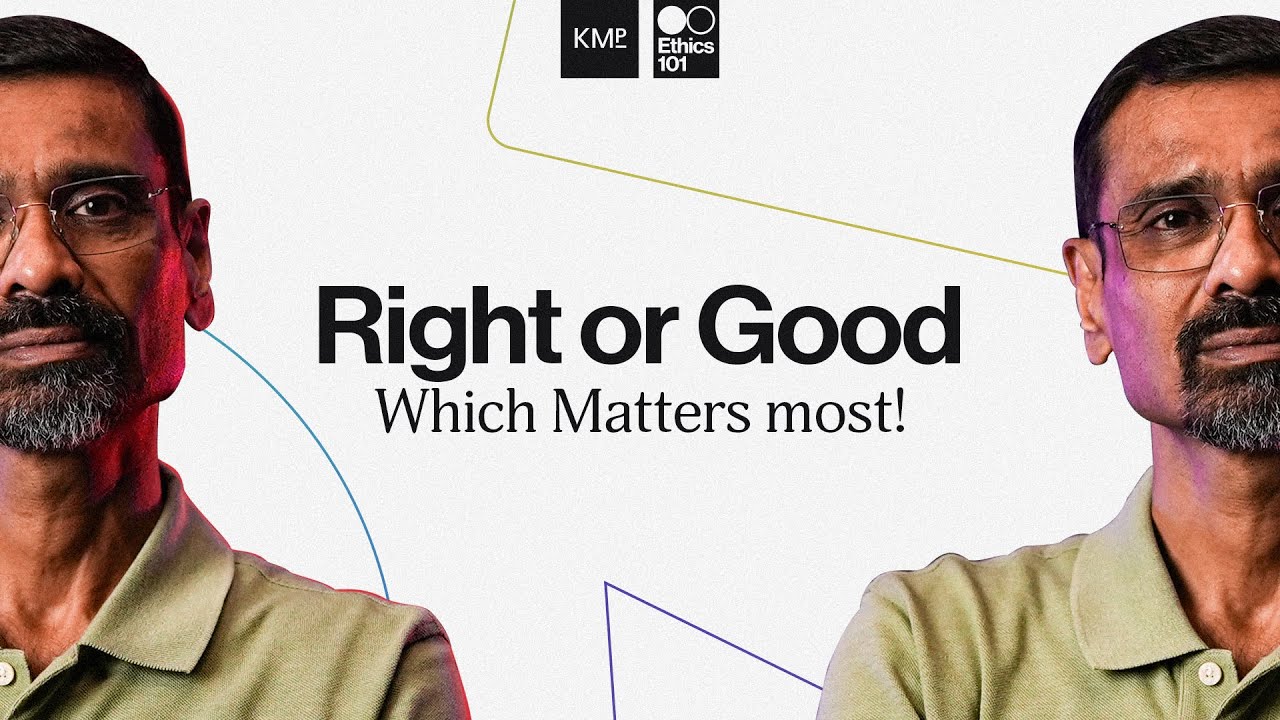Moral Equilibrium | Ethics Defined
Summary
TLDRMoral Equilibrium refers to the mental balance individuals maintain between their self-perception as good and their actions. When actions contradict this image, moral compensation occurs as people seek to restore balance by doing good. Conversely, moral licensing allows individuals to justify unethical behavior after performing honorable acts. The case of Oral Suer, a CEO who misused charity funds, exemplifies how the pursuit of moral equilibrium can lead to unethical conduct, highlighting the need for vigilance against self-permission to deviate from moral standards.
Takeaways
- 🧠 Moral Equilibrium is a psychological concept where individuals balance their self-perception as good with their actions.
- 🔄 When actions contradict a positive self-image, it creates a moral deficit, prompting moral compensation to restore balance.
- 🌟 Moral compensation involves seeking opportunities to perform good deeds to counterbalance moral deficits.
- 🚫 Moral licensing occurs when individuals, having done good, feel entitled to act unethically without feeling guilty.
- 🤔 The tendency to maintain moral equilibrium can paradoxically lead to unethical behavior.
- 👤 The example of Oral Suer, a CEO who misused charity funds, illustrates how moral licensing can corrupt even the most virtuous.
- 🔄 The mental scoreboard is a metaphor for how people track their moral standing and strive to keep it balanced.
- 💡 Awareness of moral equilibrium and licensing is crucial for maintaining ethical behavior and self-integrity.
- ⚖️ It's important to be vigilant against the natural inclination to justify unethical actions after performing good deeds.
- 🔒 Guarding against moral licensing involves constant self-reflection and adherence to ethical standards, regardless of past actions.
Q & A
What is moral equilibrium?
-Moral equilibrium is the concept where individuals maintain a mental balance between their self-perception as good people and their actual actions. It involves a continuous comparison of one's self-image with their behavior.
How does moral compensation work?
-Moral compensation occurs when individuals perform a good deed to counterbalance previous actions that were inconsistent with their positive self-image, aiming to restore moral equilibrium.
What is meant by moral licensing?
-Moral licensing happens when individuals, after performing a good deed, feel entitled to behave unethically or not live up to their ethical standards, as they believe they have earned the right due to their previous good actions.
Why might maintaining moral equilibrium lead to unethical behavior?
-Maintaining moral equilibrium might lead to unethical behavior because individuals might justify unethical actions as a form of compensation for their previous good deeds, believing they have moral credit.
Can you provide an example of moral licensing from the script?
-Yes, the script mentions Oral Suer, the CEO of United Way, who raised over $1 billion for charity but then diverted substantial sums for personal use, justifying it as a reward for his good deeds.
What is the significance of Oral Suer's actions in the context of moral equilibrium?
-Oral Suer's actions illustrate how moral licensing can lead to unethical behavior. Despite his significant charitable work, he felt licensed to misuse funds, demonstrating the potential pitfalls of moral equilibrium.
How can one guard against the inclination to depart from moral standards due to moral licensing?
-One can guard against this by being aware of the tendency towards moral licensing, regularly reflecting on one's actions, and maintaining a consistent ethical framework regardless of past good deeds.
What role does self-image play in moral equilibrium?
-Self-image plays a crucial role in moral equilibrium as it is the benchmark against which individuals measure their actions. Discrepancies between self-image and behavior can lead to attempts to restore balance through moral compensation or licensing.
Is moral equilibrium a conscious process for most people?
-Moral equilibrium is often an unconscious process, as individuals may not be fully aware of their mental scoring or the adjustments they make to maintain perceived moral balance.
How can understanding moral equilibrium help in ethical decision-making?
-Understanding moral equilibrium can help in ethical decision-making by recognizing potential biases and justifications that might lead to unethical actions, thus promoting more objective and consistent ethical standards.
Can moral equilibrium be influenced by external factors?
-Yes, moral equilibrium can be influenced by external factors such as social norms, cultural values, and the behavior of others, which can shape an individual's self-image and ethical standards.
Outlines

Dieser Bereich ist nur für Premium-Benutzer verfügbar. Bitte führen Sie ein Upgrade durch, um auf diesen Abschnitt zuzugreifen.
Upgrade durchführenMindmap

Dieser Bereich ist nur für Premium-Benutzer verfügbar. Bitte führen Sie ein Upgrade durch, um auf diesen Abschnitt zuzugreifen.
Upgrade durchführenKeywords

Dieser Bereich ist nur für Premium-Benutzer verfügbar. Bitte führen Sie ein Upgrade durch, um auf diesen Abschnitt zuzugreifen.
Upgrade durchführenHighlights

Dieser Bereich ist nur für Premium-Benutzer verfügbar. Bitte führen Sie ein Upgrade durch, um auf diesen Abschnitt zuzugreifen.
Upgrade durchführenTranscripts

Dieser Bereich ist nur für Premium-Benutzer verfügbar. Bitte führen Sie ein Upgrade durch, um auf diesen Abschnitt zuzugreifen.
Upgrade durchführenWeitere ähnliche Videos ansehen

Moral Agent | Ethics Defined

"Why Right and Good Aren't the Same!" | UPSC GS 4 Ethics | K M Pathi | Ethics101

How to enter your disciplined girl era

Как мы себя обманываем. Ключи от безысходности.

Cara Membahagiakan Ayah & Ibu - Ustadz Adi Hidayat

आज नि मनको कुरा भन्छु भन्दैमा तिम्रो घर आयो || Pradip Rodan
5.0 / 5 (0 votes)
